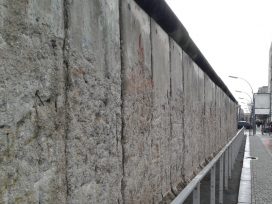Is it to spare her emotions that Slavenka Drakulic has not returned to Belgrade since the wars? She does not think so. Instead, her reasons have to do with the silence and denial of so much of Serbian society, and with a Serbian youth that is failing to ask the right questions.
Articles
Read more than 6000 articles in 35 languages from over 90 cultural journals and associates.
There's always someone who says that poetry is dead
Interview with David Lehman
While reading different internet articles about American poetry, Milan Dezinsky chanced on a midnight blogger who could not withstand a certain professor Lehman from New York. David Lehman is a poet, but he especially arouses disputes as the editor of the most famous anthology of American poetry which bears a somewhat controversial title: The Best American Poetry. Dezinsky asked him for an interview.
History without memory
Gothic morality in post-Soviet society
The witches and werewolves of post-Soviet fantasy fiction embody the morality of a society in denial about its criminal past, writes Dina Khapaeva. “Personal loyalty towards superiors and respect for hierarchy constitute gothic society’s most important and only uncontested law.”
On the eve of the 200th anniversary of Darwin’s birth and the 150th anniversary of “On The Origin of Species”, “New Humanist” editor Caspar Melville asks a selection of scientific commentators what they’d like to say to Darwin around the supper table.
Faced with the reality that renewables will be unable to replace conventional energy sources in the foreseeable future, arguments for nuclear power – that it is the cleanest and least expensive option – are causing environmentalists to reconsider, writes Angela Saini.
Russia and Ukraine have come to terms over gas supplies, but the agreement will not bring a viable long-term solution, writes Mykola Riabchuk. It runs against the political and economic interests of the Russian elite, whose pressure Ukraine lacks the capacity to withstand. The EU, meanwhile, is reluctant to play the role of strong arbiter and to help those Ukrainians who would like to introduce transparency to a criminalized energy trade.
Financial markets, like politics and the media, lurch between optimism and pessimism, confidence and crisis, boom and bust. “Esprit” editor Olivier Mongin argues that in order to understand the crisis of contemporary global finance, we should be turning not to Smith or Marx, with their emphasis on the value of work, but rather to Walras, the first to posit desire as cause of value.
At a time when anti-Ottoman bigotry abounded, the Scotsman Elias John Wilkinson Gibb was a sympathetic interpreter of Islam to the Christian West. What struck Gibb, with his “Scottish democratic intellect”, was how distant written Ottoman Turkish was from the spoken language.
“In the minds of all the Balkan nations there are two maps with two different borders. One is the contemporary map, usually called the political map of one’s state. The other is the historical map, a map sometimes secretly and often openly cherished.” Former Macedonian foreign minister Denko Maleski on Balkan nationalism and why, in the conflict between Macedonia and Greece, both sides are debating a non-existent issue.
Settled in the Present
Judit Rácz in Conversation with Péter Eötvös
“In philosophy, literature, the theatre, painting, you name it, the new is seen as a positive, indeed it is expected, whereas in music it constantly has to be justified in the teeth of opposition”. Talking in interview, Hungarian composer-conductor Péter Eötvös describes how he aims at wholeheartedly participating in the world of music: as a composer of
contemporary music, as a conductor, as a supporter of young musicians and as a mediator of musical education.
Not long ago, a journalist from the Slovenian newspaper Vecer wrote that while culture does not rank among the top priorities of Maribor’s city leaders, they are nevertheless more than happy to boast about the European Capital of Culture (ECC) project for 2012.
The controversy on multiculturalism has changed the political fronts. The Left defends respect for minority cultures while the Right stands guard over the national culture. But these two fronts merely constitute two variants of a culturalist ideology, argue Jens-Martin Eriksen and Frederik Stjernfelt.
The new ecology of war
An interview with Mike Davis
“Global epidemics and global terrorism are two problems that principally emanated from the slums. When one talks about ‘failed states’ one often means ‘failed cities’, such as Gaza, Sadr City or the slums of Port-au-Prince.” Urban theorist Mike Davis talks in interview about the evolution of the neoliberal city.
Forget Europe!
An interview with Homi Bhabha
An “interventionist, cultural-activist, pan-European community of journals” should not limit itself to an expanded Europe, Homi Bhaba suggests. The work of cultural journals is per se internationalist and has to link communities of intellectuals and activists around the world. This interview first appeared in “Crosswords”, a multilingual and transnational journal on multilingualism and digital networking, published in the context of “crosswords X mots croisés. 21st European Meeting of Cultural Journals” in Paris 2008.
Forget journals!
An interview with Mark C. Taylor
This interview first appeared in “Crosswords”, a multilingual and transnational journal on multilingualism and digital networking, published in the context of “crosswords X mots croisés. 21st European Meeting of Cultural Journals” in Paris 2008.

Places and strata of memory
Approaches to eastern Europe
The idea of 1989 as an annus mirabilis in which everything changed is too crude, writes Karl Schlögel. Rather, it was the result of a long incubation period that took a very different course in each Eastern Bloc country. In a benchmark essay for the twentieth anniversary celebrations, Schlögel stresses the entanglements and ambiguities of postwar history and asks whether it is too soon to start talking of a “common European history”.